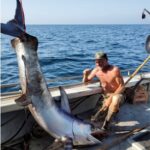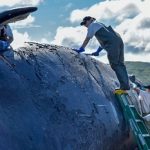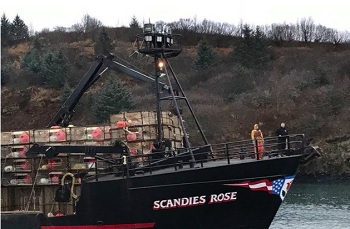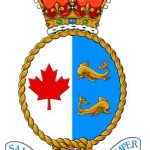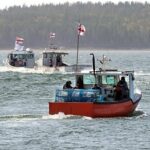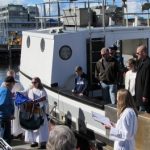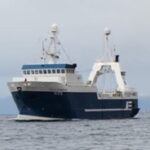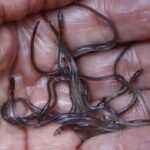Tag Archives: new-england-fishery-management-council
NOAA N.E. chief eyes delay on limits
The New England Fishery Management Council approved the proposal from the Gloucester-based coalition at its special meeting Wednesday in Wakefield. The move came in conjunction with a decision to defer setting catch limits for the groundfishery until the regularly scheduled January meeting – a time frae tha would benefit from a benchmark Gulf of Maine stock assessment and the vetting of it by the council’s Science and Statistical Committee. The coalition wrote last Monday to the council laying out a legal theory derived from an interpretation of the Magnuson-Stevens Act by NOAA last year that became the basis of a one-year interim emergency action on inshore cod that kept the reduction in landings to 22 percent. Read more
New England Fishery Management Council Meeting Motions, December 20, 2012
December 20, 2012 Sheraton Colonial Wakefield, MA Council Meeting Motions –
When you get to the sight, click “COUNCIL ACTIONS” This is at the top.Council Meeting Actions – 2012
December 20, 2012 Sheraton Colonial Wakefield, MA
Click “COUNCIL AUDIO” Click “Groundfish FW 48 Discussion (AM) (few minutes at the beginning of discussion not recorded)
Listen in its entirety or left click the slider and move it to 1:55.00 to listen to the public comments
U.S. Reopens Waters Off New England for Fishing – NYT
Jud Crawford, the science and policy manager for the Pew Environment Group’s Northeast Fisheries program, said the decision to reopen protected waters could have dire consequences. “One of the concerns is that we will very quickly lose some very important breeding stock in these places,” Mr. Crawford said. The council’s vote is subject to approval by the National Oceanic and Atmospheric Administration’s Fisheries Program, which is expected to act by May. Read More
Fish panel holds off on limit cuts – “I say if you’re going to take 1 damn percent (more), shut the whole God damn thing down!”
 New England fishing regulators Thursday delayed voting on a series of significant cuts to fishermen’s 2013 allowable catch in groundfishing stocks after repeated and emotional warnings that the reductions would finish off an industry already grappling with a federally recognized economic “disaster.” The New England Fishery Management Council voted 15-2 to put off deciding on new catch limits for various bottom-dwelling groundfish species until their next meeting, scheduled for the end of January. Read More
New England fishing regulators Thursday delayed voting on a series of significant cuts to fishermen’s 2013 allowable catch in groundfishing stocks after repeated and emotional warnings that the reductions would finish off an industry already grappling with a federally recognized economic “disaster.” The New England Fishery Management Council voted 15-2 to put off deciding on new catch limits for various bottom-dwelling groundfish species until their next meeting, scheduled for the end of January. Read More
Your View: Fishery council must reject unreliable assessments – By Richard Canastra – southcoasttoday
I nearly always attend New England Fishery Management Council meetings in person, but last month, I was unable to attend the meeting in Newport, and instead listened to the proceedings online. I found that listening, and not physically being there, gives you a different perspective on a meeting. You hear more intently. There are fewer distractions. Examples seem clearer. Patterns emerge. There are some predictable patterns in life. When there is an accident, at the end of the traffic jam you find a police officer. When you go to a restaurant, at the end of dinner the bill comes. And when you attend a fisheries management council meeting that is dealing with a crisis, there is usually a bad stock assessment.
Bad stock assessments have become as predictable as the sunrise. Read More
Share and Share Alike
As a citizen advocate of the fishing industry, I have no confidence in NOAA stock assessments.
I spend a lot of time reviewing material, attempting to convey the results to as many people possible.
These listening sessions allow, as Mr Canastra stated, patterns to emerge.
The patter of Bill Karp, and Sam Rauch deviates not from the typical bureaucratic structure, much to my disappointment after listening to them from various venues, and reading a lot of information.
The revelations of the Georges Bank Yellowtail Flounder Working Group Meeting May 23, 2012, are the foundation of my opinion to condemn the stock assessments as a tool for fishery management, while enforcing Mr Canastras belief that the proper equipment is not being utilized to sample yellow tail flounder abundance.
As stated, patterns have emerged. The pattern of over looking details that have detrimental affects on stock assessments and confidence in them.
At the The New England Fishery Management Council’s three-day meeting in Plymouth Ma on 9/25/2012, a major detail confirmed the retrospective patter of no confidence in stock assessments conducted by NOAA.
During the 54th Stock Assessment Workshop (SAW)/Stock Assessment Review Committee (SARC) Meetings, a fisherman asked a question that received a hollow shrug of the shoulders answer that I find alarming, and telling that these assessments are substandard and incomplete.
The question was, “why is there no mention of herring as a predator species” in the ground fish assessment?
The answer. ” The SSC was, ah, not presented, ah, ah herring as a, ah, predator species….”
Yes. A Retrospective Pattern of the science used to mismanage this industry is established.
No confidence.
NOAA region chief Bullard hedges on interim limits
The coalition theory was based on an interpretation of the Magnuson-Stevens Act for building a second year of relief — “reducing” rather than “ending” overfishing — while a plan to bring the stock to maximum sustainable yield is crafted.,“I’m not going to opine on whether you can squeeze another year out of (the Magnuson regulations),” Bullard said in a Thursday interview at the Times. “We’re willing to take a look at this at the meeting.” Read More
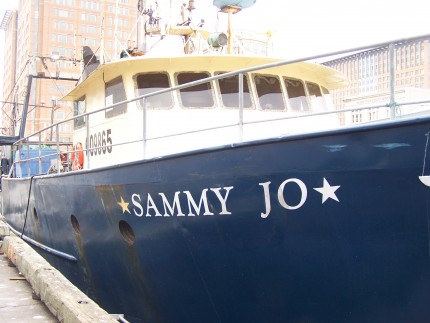
Feds consider opening New England Closed fishing areas. National Oceanic and Atmospheric Administration would still have to approve.
BOSTON (AP) — There are five zones off the New England coast drawn in varying angles and shapes, all rich with fish, or at least they were at one time. It’s why regulators looking to preserve valuable species closed these areas to certain kinds of fishing year-round, beginning in the 1990s. Two decades later, a fishing industry in crisis wants to get back in. http://www.seacoastonline.com/articles/20121215-NEWS-121219828
NEFMC Seeks Applicants for Fishery Advisory Panel Vacancies
Currently, the Council invites applicants to fill vacant seats on its Groundfish, Recreational Fishing, Monkfish, Sea Scallop, Herring and Enforcement Panels. Anyone interested in serving as an advisor to one or more of these panels may download the application materials; call the Council office at 978.465.0492. If you have any questions or need more specific information about panel responsibilities or upcoming Council actions during 2013, please contact Pat Fiorelli at 978.465.0492, ext. 106 or Read more here
[email protected]
.
NOAA / NMFS Reopens public comment period. Proposed Rule to Expand Exempted Redfish Fishery for Groundfish Sectors
ACTION: Proposed rule; reopening of comment period.
SUMMARY: This action reopens the comment period for an Acadian redfish proposed rule that published on November 8, 2012. The original comment period closed on November 23, 2012; the comment period is being reopened to provide additional opportunity for public comment through December 31, 2012. http://www.nero.noaa.gov/mediacenter/2012/11/redfish_extension.pdf
Lawyer blasts NOAA ‘failure’ on fishing – gdt
 “This Thanksgiving, I want to give an overdue thanks to the region’s remaining fishermen who brave the elements and bring my family fish and seafood products to eat,” Shelley wrote. “All of us have failed to provide you with a rational, predictable and equitable business environment in which to nourish your hopes of being part of the American dream.“The system has failed you and will continue to fail you as long as it continues to give each of you what you individually demand.”Shelley’s harsh judgment comes as a time when NOAA, led by Jane Lubchenco, is under fire from industry groups and congressional figures from both parties for its policies.
“This Thanksgiving, I want to give an overdue thanks to the region’s remaining fishermen who brave the elements and bring my family fish and seafood products to eat,” Shelley wrote. “All of us have failed to provide you with a rational, predictable and equitable business environment in which to nourish your hopes of being part of the American dream.“The system has failed you and will continue to fail you as long as it continues to give each of you what you individually demand.”Shelley’s harsh judgment comes as a time when NOAA, led by Jane Lubchenco, is under fire from industry groups and congressional figures from both parties for its policies.
What a phoney bastard. BH
http://www.gloucestertimes.com/topstories/x520553412/Lawyer-blasts-NOAA-failure-on-fishing
Rep. Antonio F.D. Cabral-Fishing industry needs research money as well as disaster relief
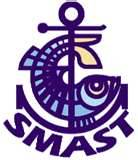 The elections may be over, but the current Congress still has work to do…..We need reliable, independent science. And Massachusetts is best equipped to provide it….That’s because there has not been adequate, sustained funding for independent research centers…..environment using scientific evidence that is, by its own scientists’ admission, often unspecific, unproven and unreliable. NOAA has been put in the position of acting not only as judge and jury, but as prosecution, defense and expert witness…..In particular, the School for Marine Science and Technology (SMAST) at UMass Dartmouth is uniquely suited to provide this research. SMAST has an ideal location as well as a history of fostering positive collaboration between all fishing stakeholders. SMAST can also boast a proven record of success in fishery research. In the 1990s the scallop industry was on the verge of collapse when SMAST pioneered new research on a very tight budget that proved the scallop population wasn’t devastated, http://www.southcoasttoday.com/apps/pbcs.dll/article?AID=/20121118/OPINION/211180303
The elections may be over, but the current Congress still has work to do…..We need reliable, independent science. And Massachusetts is best equipped to provide it….That’s because there has not been adequate, sustained funding for independent research centers…..environment using scientific evidence that is, by its own scientists’ admission, often unspecific, unproven and unreliable. NOAA has been put in the position of acting not only as judge and jury, but as prosecution, defense and expert witness…..In particular, the School for Marine Science and Technology (SMAST) at UMass Dartmouth is uniquely suited to provide this research. SMAST has an ideal location as well as a history of fostering positive collaboration between all fishing stakeholders. SMAST can also boast a proven record of success in fishery research. In the 1990s the scallop industry was on the verge of collapse when SMAST pioneered new research on a very tight budget that proved the scallop population wasn’t devastated, http://www.southcoasttoday.com/apps/pbcs.dll/article?AID=/20121118/OPINION/211180303
Cape Cod scallop fleet cries foul
Much of the best fishing terrain lies in and around the Great South Channel that separates Georges Bank from the mainland, and north in the Gulf of Maine, according to the council’s habitat study, and is listed as a likely site for closure or restrictions. Requiring these new habitat protection zones could be considered as an ecological trade-off for allowing fishermen access to areas currently closed to most fishing, according to the council. http://www.capecodonline.com/apps/pbcs.dll/article?AID=/20121115/NEWS/211150334
Fish panel snubs U.S., Canada limits Gloucester Daily Times
 NOAA’s New England Fishery Management Council Wednesday heaped derision on a joint assessment of yellowtail flounder conducted jointly by U.S. and Canadian scientists, then trashed the minuscule allocation of the stock based on work that even the agency’s chief regional scientist declined to defend, except to say it was the best “available” and therefore binding. http://www.gloucestertimes.com/topstories/x179000228/Fish-panel-snubs-U-S-Canada-limits
NOAA’s New England Fishery Management Council Wednesday heaped derision on a joint assessment of yellowtail flounder conducted jointly by U.S. and Canadian scientists, then trashed the minuscule allocation of the stock based on work that even the agency’s chief regional scientist declined to defend, except to say it was the best “available” and therefore binding. http://www.gloucestertimes.com/topstories/x179000228/Fish-panel-snubs-U-S-Canada-limits
Regulators approve higher yellowtail flounder catch- more than twice what was recommended – Good Enough, then.
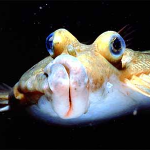 Northeast fishing regulators have approved a 2013 catch limit for yellowtail flounder on Georges Bank that’s more than twice what was recommended by a committee that negotiates the shared catch with Canada.
Northeast fishing regulators have approved a 2013 catch limit for yellowtail flounder on Georges Bank that’s more than twice what was recommended by a committee that negotiates the shared catch with Canada.
Members of the New England Fishery Management Council, who met today in Newport, R.I., said they had no choice, in order to avoid the collapse of the local fishing and scalloping industries.
But it came amid warnings that approval could destroy the longtime trade agreement with Canada. And it came even though the Northeast’s top federal regulator said the approval won’t pass legal muster.
A low catch limit on yellowtail threatens fishermen who chase other species in Georges Bank. Since many accidentally catch yellowtail, they’re given a yellowtail catch limit, which they can’t exceed without triggering severe restrictions that threaten their businesses. THE ASSOCIATED PRESS
New Bedford Mayor urges reopening of US-Canada discussion on yellowtail flounder
Urges co uncil to accept SSC recommendations including suspension of directed fishery; notes widespread lack of confidence in fishery assessment. WASHINGTON (Saving Seafood) Nov. 14, 2012 — New Bedford Mayor Jon Mitchell, representing the nation’s most profitable fishing port, appeared before the New England Fishery Management Council (NEFMC) in Newport, Rhode Island this morning, and delivered a letter making the following points:
uncil to accept SSC recommendations including suspension of directed fishery; notes widespread lack of confidence in fishery assessment. WASHINGTON (Saving Seafood) Nov. 14, 2012 — New Bedford Mayor Jon Mitchell, representing the nation’s most profitable fishing port, appeared before the New England Fishery Management Council (NEFMC) in Newport, Rhode Island this morning, and delivered a letter making the following points:
“The fishing industry, in general, is in a very negative mood,” The Controversial Science of Counting Fish
At the meeting in Portsmouth on Friday, scientists detailed the complexities and uncertainties of counting fish that live out of sight. They also took questions from fishing industry advocates frustrated over what they say are shifting and incorrect population estimates that have led to lower catch limits and damaged their businesses http://www.seacoastonline.com/articles/20121112-NEWS-211120323
AUDIO: Highlights of NOAA’s Fishermen’s Northeast Groundfish Science Forum. Great Report from savingseafood.org
November  9, 2012 — Today, NOAA conducted a Fishermen’s Northeast Groundfish Science Forum in Portsmouth, New Hampshire, allowing fishermen and members of the public to interact with NOAA officials on groundfish science.
9, 2012 — Today, NOAA conducted a Fishermen’s Northeast Groundfish Science Forum in Portsmouth, New Hampshire, allowing fishermen and members of the public to interact with NOAA officials on groundfish science.
The following is a summary of the morning session. A summary of the afternoon session will be published next week. Throughout the summary below are links to audio highlights of the day’s meeting. http://www.savingseafood.org/science/audio-highlights-of-noaas-fishermens-northeast-groundfish-science.html?utm_source=feedburner&utm_medium=email&utm_campaign=Feed%3A+SavingSeafoodRss+%28Saving+Seafood%29
LIVE – Northeast Groundfish Science Forum – Listen via Webinar set for November 9 begin at 8:30AM,
Registration is not required, but we are trying to get a headcount. To confirm your participation or for more information, contact Teri Frady at [email protected] / 508 495 2239.
Speakers have been added and the agenda has been further developed since the first announcement. The forum will also be available via webinar . An audio recording will be posted afterward. http://www.nefsc.noaa.gov/groundfish/meetings/
Fish council eyes December for ’13 limits By Richard Gaines Staff Writer GDT
The New England Fishery Management Council has set a special one-day meeting Dec. 20 to take final action on most groundfish allocations for the 2013 fishing year that begins May 1, and take near final action on Framework 48 which updates and refines Amendment 16 and its catch share maagement system. The special meeting was spun off the November council meeting set for Newport, R.I., due to the welter of issues. http://www.gloucestertimes.com/local/x1499658911/Fish-council-eyes-December-for-13-limits
Cape Cod’s fishermen fret over seals, dogfish and the future
Two areas, 35-miles south and 150-miles east of Chatham have been closed for cod and other groundfish but the National Marine Fisheries Service is contemplating re-opening to help fishermen because all fishermen are facing drastic cuts of 70 percent in cod and 73 percent in haddock on Georges Bank. But not all fishermen are enthused.
Then there’s this insight by someone who can’t be very smart.
Wholesaler Andy Baler of the Nantucket Fish Company noted that huge mid-water trawlers are catching tons of herring off shore while the National Marine Fisheries Service looks idly on. “Cod and haddock feed on local herring but they’re starving. That’s why you see fish so skinny,” he said. “The mid-water trawlers are going to suck every bit of bait out there. You have one management system for some fish and another management system that goes and kills all the fish they eat.” Bullard conceded the two plans are un-connected. NOAA takes a fish by fish approach. “This port is crushed. We’re living on a few dogfish,” Baler declared. “We need some help. Keep the herring here so we can fish the channel.”
Read more: Cape Cod’s fishermen fret over seals, dogfish and the future – – Harwich Oracle http://www.wickedlocal.com/brewster/newsnow/x1826353094/Cape-Cods-fishermen-fret-over-seals-dogfish-and-the-future#ixzz29O2eBrZ9
The relationship is this. The larvae of the bottom fish need to go to the surface of the ocean in order to obtain food – plankton – and light. While they go up, they become a feast for the pelagics. When those larvae that survive become codlThe relationship is this. The larvae of the bottom fish need to go to the surface of the ocean in order to obtain food – plankton – and light. While they go up, they become a feast for the pelagics. When those larvae that survive become codlings, they want to go back to their friends and relatives. While they descend to their native habitat, they become a second feast for the pelagics.
http://carmine3.newsvine.com/_news/2010/11/04/5408211-fish-and-future
Northeast Seafood Coalition issues statement on Accumulation Caps, Fleet Diversity, and “Amendment 18” – savingseafood.org
NSC believes any and all groundfish management measures must be highly sensitive to the potential for unintended consequences to all segments of this fragile fishery.
WASHINGTON (Saving Seafood) October 12, 2012 — On Wednesday, October 10, the Gloucester Daily Times reported that “NOAA’s regional administrator, joined by the Environmental Defense Fund,
the Pew Environment Group, the North Atlantic Marine Alliance and Food & Water Watch, is supporting a belated effort by the federal government to limit the accumulation of catch shares and thus provide
safeguards to smaller independent boats in the Northeast groundfishery…”




































